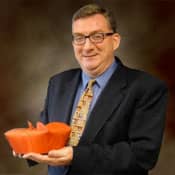An important characteristic of Newman's thought is balance between opposite extremes. Too conservative for liberals and too liberal for conservatives, he transcends both labels. While he spent his life fighting secularism and relativism, he also saw in certain Church quarters "a narrowness which is not of God":
Instead of aiming at being a world-wide power, we are shrinking into ourselves, narrowing the lines of communion, trembling at freedom of thought, and using the language of disarray and despair at the prospect before us, instead of, with the high spirit of the warrior, going out conquering and to conquer.
Pope Leo XIII (1878-1903) vindicated Newman when he named him a Cardinal in 1879, for his contributions to Catholic intellectual life. "The cloud is lifted from me forever," Newman wrote. The English people, Catholic and non-Catholic, hailed this move. Oxford invited him back, making him an honorary fellow of his old college. His last years were peaceful ones.
John Henry Newman died at 8:45 p.m., on Monday, August 11th, 1890. Today his writing is still included in English anthologies, and books continue to be written. A poet, letter writer, essayist, preacher, novelist, scholar, philosopher, and theologian, no other writer of his time had such versatility. His writings on freedom of conscience and the role of the laity, as well as his dynamic view of the Church, had a profound effect on the Second Vatican Council (1962-1965), which addressed these topics in its proceedings.
As a Cardinal, Newman's motto was Cor Ad Cor Loquitur ("Heart speaks to heart"). Today he still speaks to a Church dealing with scandal. Regarding this issue, he wrote:
The whole course of Christianity from the first . . . is but one series of troubles and disorders. Every century is like every other, and to those who live in it seems worse than all times before it. The Church is ever ailing . . . Religion seems ever expiring, schisms dominant, the light of truth dim, its adherents scattered. The cause of Christ is ever in its last agony.
But the Church was like Noah's ark, "which did not hinder or destroy the flood but rode upon it, preserving the hopes of the human family within its fragile planks."
One bishop said of Newman, "There is a saint in that man!" Another contemporary called him "a being unlike anybody else." One visitor commented that a "light emanated from his person." A recent study labels Newman "a saintly scholar and a scholarly saint." But when called a saint, Newman replied that they "are not literary men." He would be content, he said, to polish the saints' shoes, if they used "blacking in heaven."





